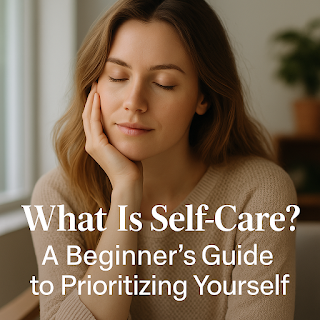🌿 What Is Self-Care? A Beginner’s Guide to Prioritizing Yourself
In today’s fast-paced world, it’s easy to put everyone else’s needs before your own. Work deadlines, family obligations, and social commitments often leave little room for self-care. But here’s the truth: taking care of yourself isn’t selfish—it’s essential.
This beginner’s guide will help you understand what self-care really means, why it matters, and how you can start prioritizing your own well-being without guilt.
🧘♀️ What Is Self-Care?
At its core, self-care is the practice of taking action to preserve or improve your own health, well-being, and happiness. It’s about listening to your body and mind, recognizing what you need, and making time for those needs.
Self-care isn’t just bubble baths and spa days (though those can be great too). It’s about:
✅ Setting boundaries
✅ Nourishing your body with healthy food
✅ Resting when you’re tired
✅ Saying “no” when you’re overwhelmed
💡 Think of self-care as recharging your internal battery so you can show up as your best self—in every part of your life.
🧠 Why Is Self-Care Important?
When you neglect self-care, the consequences can pile up quickly:
-
Burnout
-
Increased stress and anxiety
-
Trouble sleeping
-
Strained relationships
-
Decreased productivity
On the other hand, regular self-care can:
🌟 Improve mental clarity and focus
🌟 Boost mood and emotional resilience
🌟 Strengthen your immune system
🌟 Help you build healthier relationships with others
✨ By prioritizing yourself, you’re not taking away from others—you’re ensuring you have the energy and presence to give your best to them.
🚦 7 Signs You Need More Self-Care
Wondering if you need to hit the pause button? Here are common warning signs:
-
You feel exhausted all the time, even after sleeping.
-
You’re irritable and snapping at loved ones.
-
Your to-do list feels overwhelming.
-
You have little or no time for hobbies or fun.
-
Your diet consists of coffee and takeout.
-
You’re neglecting your physical health.
-
You feel guilty taking even 5 minutes for yourself.
If any of these sound familiar, it’s time to make a change.
🌱 10 Self-Care Practices to Start Today
You don’t need hours each day to take care of yourself. Start small with these simple and effective self-care ideas:
1️⃣ Set Boundaries
Learn to say “no” to commitments that drain your energy. Protect your time for rest and things you enjoy.
2️⃣ Move Your Body
Take a 15-minute walk, stretch, dance, or do yoga. Physical movement is a natural stress reliever.
3️⃣ Eat Nourishing Foods
Fuel your body with whole, nutrient-dense foods that give you energy and support mental clarity.
4️⃣ Get Enough Sleep
Aim for 7–8 hours of quality sleep each night. Create a bedtime routine to wind down.
5️⃣ Practice Mindfulness
Try meditation, deep breathing, or simply sit in silence for 5 minutes. Calm your mind and reconnect with yourself.
6️⃣ Stay Hydrated
Drink plenty of water throughout the day. Dehydration can lead to fatigue and brain fog.
7️⃣ Disconnect from Screens
Take regular breaks from phones, computers, and social media. Protect your mental space.
8️⃣ Spend Time in Nature
A short walk outdoors can lower stress hormones and boost your mood.
9️⃣ Connect with Loved Ones
Spend quality time with people who lift you up and support your well-being.
🔟 Do Something Fun
Rediscover hobbies that make you happy—reading, painting, gardening, or listening to music.
💡 Common Myths About Self-Care
❌ “I don’t have time for self-care.”
✅ Even 5–10 minutes a day can make a big difference.
❌ “Self-care is selfish.”
✅ Taking care of yourself allows you to show up fully for others.
❌ “Self-care is expensive.”
✅ Self-care doesn’t require spa days or luxury products. A quiet moment with a cup of tea counts too.
📝 How to Create Your Own Self-Care Plan
Here’s how to get started with a personal self-care routine:
-
Assess your needs: Where do you feel depleted—physically, emotionally, or mentally?
-
Start small: Choose 1–2 habits to focus on this week.
-
Schedule it: Block time in your calendar for self-care, just like you would for any other priority.
-
Be consistent: Regular small actions are more powerful than occasional big ones.
-
Adjust as needed: Listen to your body and mind and adapt your routine over time.
🌟 Final Thoughts
Self-care isn’t a luxury; it’s a necessity. By prioritizing your own well-being, you’re investing in a healthier, happier, and more resilient version of yourself.
✨ Start small. Start today. Because you deserve care too.

